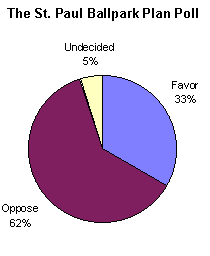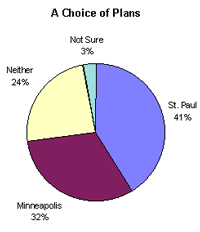Poll Shows Little Support for Ballpark Plans
By Michael Khoo
July 1, 1999
A new poll commissioned by Minnesota Public Radio, the St. Paul Pioneer Press, and KARE-TV shows significant opposition to ballpark plans in both Minneapolis and St. Paul. Roughly two-thirds of respondents in both cities object to current proposals to use tax dollars to finance a new ballpark for the Minnesota Twins. Stadium supporters on both sides of the river say they are not surprised by the findings, but they still believe a stadium package could be crafted in the public interest.
THE RESULTS OF THE CURRENT POLL
should not come as a shock to anyone. They mirror the findings of several similar studies, including polls
commissioned during the last stadium debate in 1997 and one conducted last month
by the St. Paul Area Chamber of Commerce. In each case, the sample size was a
little different, the questions were a little different, and the screening
process was a little different. But the results remain consistent familiar:
roughly two-thirds opposed public financing of professional sports facilities.
Ed Lima, one of 408 Minneapolitans contacted for the latest poll, along with 417 St. Paul residents summed up the feelings of most of those polled. "If the Twins management wants to build a stadium, well, by golly, let them," he says." By the gum, have at it. But I'm opposed to public money being spent for it."
In Minneapolis, 68 percent of respondents say they are against a plan to finance a new Twins ballpark with a half-percentage point hike in the Hennepin County sales tax. The tax hike would also be used to provide property tax relief and other infrastructure improvements. Lima says he believes a new stadium could contribute to economic activity downtown, but he says no more so than other private enterprises. "You know, if there was a Dayton's there or an NSP there, or any other business, They have no special place there."
Hennepin County Commissioner Peter McLaughlin says he understands the public skepticism revealed in the poll, but he says the details of the financing plan haven't been completed; for example, what percentage of the sales tax increase should go to property-tax relief versus how much should be spent on a ballpark. "I think there's got to be fair return for the public dollars," McLaughlin says. "I think there's got to be an adequate contribution from the team. I think there's got to be a sense, in terms of baseball, that Major League Baseball is fixing the gross inequities between the large markets and the small market team."
Across the river in St. Paul, the mood is not much different. Sixty-two percent of respondents say they oppose Mayor Norm Coleman's plan to increase the city sales tax by a half-percent to raise $100 million for a new ballpark. The state and the Twins would contribute similar amounts. But St. Paul resident Margaret Kuehn, one of those polled, says the money should come exclusively from the Twins and the fans who attend the games.
"I'm a senior citizen and I am on a fixed income," Kuehn points out. "And I think the players and Carl Pohlad are living very comfortably, and if they want the stadium, they should pay for it. I don't believe the public should have to be taxed extra."
Kuehn's opinion of the Twins and team owner Carl Pohlad is not unique. The poll shows less than half of respondents have a favorable opinion of the team - and in St. Paul, 55 percent have an unfavorable opinion of Pohlad. In Minneapolis, 51 percent report the same. Eric Mische, an aide to Mayor Coleman and his point man on the stadium debate, says focusing on the salaries of the players and the owners misses the point.
"This issue is not about Carl Pohlad," Mische maintains. "This issue is about whether or not we should keep Major League Baseball in Minnesota, in St. Paul. And this issue is about creating more jobs, bringing two to three million people to downtown St. Paul. In the end, that's what people will make their decision upon."
Mische says
he's encouraged that a larger share of St. Paul residents seem to believe in the
economic justification for a ballpark than their Minneapolis counterparts. He
contributes the difference to Coleman's advocacy and his repeated message that a
ballpark can jumpstart the urban core. Moreover, he says, as more and more
residents understand the economic implications, he expects support to grow. If
it does, that support could pay off next November when Coleman's plan will
likely appear on the ballot as a city-wide initiative. After that comes the
state legislature.
Steve Sviggum, speaker of the Minnesota House of Representatives,
says he is not surprised by the poll results. He says a majority Minnesotans
feel financing professional sports facilities is not an appropriate function of
government. "I don't see the legislature passing any bill that either increases
taxes or uses general fund revenues to subsidize professional sports stadium," Sviggum said.
Yet both the St. Paul and the Minneapolis-Hennepin County plans would require approval by the Legislature in order to raise local sales taxes.
But some lawmakers are willing to consider the stadium proposals. Republican Senator Roy Terwilliger of Edina says he hasn't studied either plan in detail, but he thinks it's premature to rule them out. Terwilliger previously authored legislation supporting a stadium based on users-fees. That proposal was defeated.
By Michael Khoo
July 1, 1999
|
|
RealAudio 3.0 |
A new poll commissioned by Minnesota Public Radio, the St. Paul Pioneer Press, and KARE-TV shows significant opposition to ballpark plans in both Minneapolis and St. Paul. Roughly two-thirds of respondents in both cities object to current proposals to use tax dollars to finance a new ballpark for the Minnesota Twins. Stadium supporters on both sides of the river say they are not surprised by the findings, but they still believe a stadium package could be crafted in the public interest.
|
|
|
|
|
||
|
|
||
Ed Lima, one of 408 Minneapolitans contacted for the latest poll, along with 417 St. Paul residents summed up the feelings of most of those polled. "If the Twins management wants to build a stadium, well, by golly, let them," he says." By the gum, have at it. But I'm opposed to public money being spent for it."
In Minneapolis, 68 percent of respondents say they are against a plan to finance a new Twins ballpark with a half-percentage point hike in the Hennepin County sales tax. The tax hike would also be used to provide property tax relief and other infrastructure improvements. Lima says he believes a new stadium could contribute to economic activity downtown, but he says no more so than other private enterprises. "You know, if there was a Dayton's there or an NSP there, or any other business, They have no special place there."
Hennepin County Commissioner Peter McLaughlin says he understands the public skepticism revealed in the poll, but he says the details of the financing plan haven't been completed; for example, what percentage of the sales tax increase should go to property-tax relief versus how much should be spent on a ballpark. "I think there's got to be fair return for the public dollars," McLaughlin says. "I think there's got to be an adequate contribution from the team. I think there's got to be a sense, in terms of baseball, that Major League Baseball is fixing the gross inequities between the large markets and the small market team."
Across the river in St. Paul, the mood is not much different. Sixty-two percent of respondents say they oppose Mayor Norm Coleman's plan to increase the city sales tax by a half-percent to raise $100 million for a new ballpark. The state and the Twins would contribute similar amounts. But St. Paul resident Margaret Kuehn, one of those polled, says the money should come exclusively from the Twins and the fans who attend the games.
"I'm a senior citizen and I am on a fixed income," Kuehn points out. "And I think the players and Carl Pohlad are living very comfortably, and if they want the stadium, they should pay for it. I don't believe the public should have to be taxed extra."
Kuehn's opinion of the Twins and team owner Carl Pohlad is not unique. The poll shows less than half of respondents have a favorable opinion of the team - and in St. Paul, 55 percent have an unfavorable opinion of Pohlad. In Minneapolis, 51 percent report the same. Eric Mische, an aide to Mayor Coleman and his point man on the stadium debate, says focusing on the salaries of the players and the owners misses the point.
"This issue is not about Carl Pohlad," Mische maintains. "This issue is about whether or not we should keep Major League Baseball in Minnesota, in St. Paul. And this issue is about creating more jobs, bringing two to three million people to downtown St. Paul. In the end, that's what people will make their decision upon."
|
|
|
|
|
||
|
|
||
Yet both the St. Paul and the Minneapolis-Hennepin County plans would require approval by the Legislature in order to raise local sales taxes.
But some lawmakers are willing to consider the stadium proposals. Republican Senator Roy Terwilliger of Edina says he hasn't studied either plan in detail, but he thinks it's premature to rule them out. Terwilliger previously authored legislation supporting a stadium based on users-fees. That proposal was defeated.


